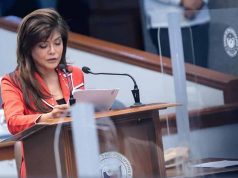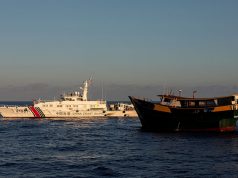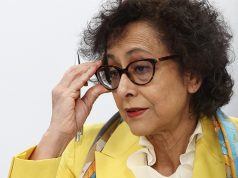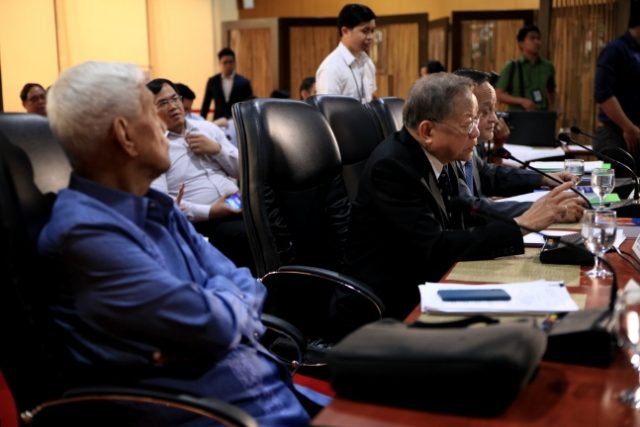
Advocates of federalism say they are not out to overhaul the 1987 Constitution, but just to tweak the provisions that will facilitate the transition to a new form of government.
According to Department of the Interior and Local Government Assistant Secretary for Communications and Public Affairs Jonathan Malaya, who is also working with the Consultative Commission (ConCom) tasked by President Rodrigo Duterte to review the 1987 Constitution and, and who helped craft the PDP-Laban’s proposed model of federalism, the commission hope to hand over its recommendations by the time Duterte delivers his State of the Nation Address this July.
“The ’87 Constitution has a lot of good provisions. And we do not wish to create an entirely new Constitution,” Malaya said Friday in a forum on federalism at the Ateneo Professional Schools in Makati City.
“(It) allowed us to shift from an authoritarian regime to a democracy, and we commend that, and recognize that. That’s why many of the provisions of the ’87 Constitution will be left untouched.”
He noted that former Chief Justice Reynato Puno, the ConCom chair, and retired Associate Justice Antonio Nachura are just some of the members who will ensure that the “good provisions” are not changed.
“Some of the changes will come in the local government articles and, if we wish to change the economic provisions and remove the restrictive economic provisions of the Constitution, then we will change those,” Malaya explained.
As to the kind of federal government that will be considered for the Philippines, he noted that there is no “one-size-fits-all model of federalism”.
“We should develop our own Philippine federalism model,” Malaya said. “We (can) keep the best practices of the unitary system if we want.”
As an example, he pointed out that police forces in federal countries are usually localized. The Philippines had tried that before, with police forces reporting to the mayors.
“And the police forces, some of them, became private armies of the mayor, which led to the impetus for creating the integrated national police,” Malaya said.
The country can keep the benefits it is reaping from the current unitary form of government, and design a federal system that will address its problems. “If there’s nothing broken with it, why should we fix it?” he asked, adding that experts should examine the government’s functions and discern which ones can best be delivered by the local government, and which ones by the national government.
“With the anti-political dynasty provision, I think we can start trusting our local officials,” Malaya said.
On Wednesday, ConCom agreed to adopt “strong, self-executing provisions to regulate political dynasties,” the Philippine News Agency reported. They proposed prohibitions “for a family member to succeed or replace another member who is an incumbent public official; for members of one family to hold multiple positions; and for members of one family to run simultaneously for multiple positions.”
PNA noted that ConCom agreed to apply the prohibition up to the second degree of consanguinity and affinity.
Meanwhile, Malaya articulated the need for federalism by presenting two images: one of the streets of Bonifacio Global City in Taguig, and another of shanties leading to the Ninoy Aquino International Airport in Pasay City.
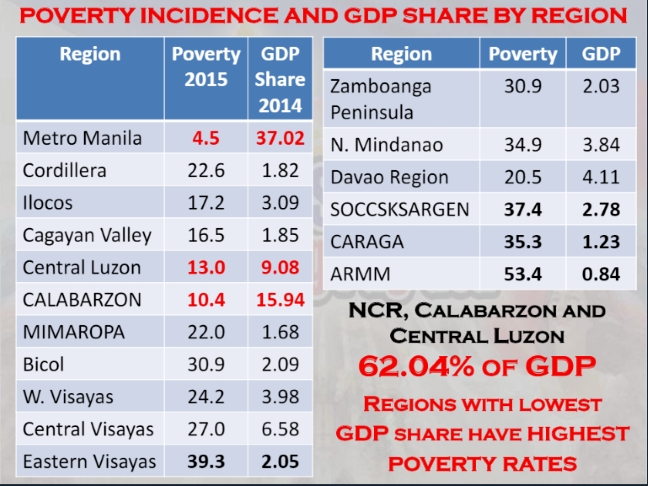
(Above) ConCom chart depicts poverty incidence and gross domestic product share by region, as of 2014 and 2015.
Up to 62 percent (or almost two-thirds) of the country’s gross domestic product is attributed to just three regions: the National Capital Region, Central Luzon, and CALABARZON.
This is why people from other regions come to Manila – there are no jobs back home. And if they can’t find jobs in Manila, said Malaya, they go to Kuwait, where “their employer kills them, puts them in a freezer.”
He was referring to overseas Filipino worker Joanna Demafelis, whose body was found by Kuwaiti authorities in a freezer inside her employers’ rented apartment recently. An autopsy revealed that she was beaten and tortured repeatedly, and was already dead when stuffed inside the freezer.
Malaya said the mass migration of people to more prosperous regions, as well as abroad, was caused by the imbalance of economic development. This, in turn, was the result of too much money in the national government. Very little is allocated to local government units to spur decentralized development, he said.
“The sad part of all of this money concentrated in Manila is that the national government cannot even spend all of it,” Malaya said, recalling his stint at the Department of Education.
“Our textbook procurement, which runs into billions, are all centralized here in Manila, in Pasig. We used to bid two billion (pesos) worth of textbooks. Every other month we bid. Once there is a failure of bidding in Pasig, the entire nation suffers. All public school students (suffer),” he narrated.
He continued: “The national government does not have the money, the resources, the time to spend all that money. That money has to be spread out, and that is through a federal system of government.
“Why do we need to spread out the money? Because only government can create the atmosphere for economic development. Even if Lucio Tan, Henry Sy, and all of the big taipans build malls, build whatever, across the country, they will never be able to build it if there are no roads, if there are no telecommunication facilities, if there are no bridges, if there isn’t a regulatory environment conducive to business. Only government can provide that.”
“The solution to our poverty problem lies in government,” he concluded. “Government has to be refashioned, government has to be reinvented so that development may happen. Private capital alone cannot bring the Philippines out of poverty.”




